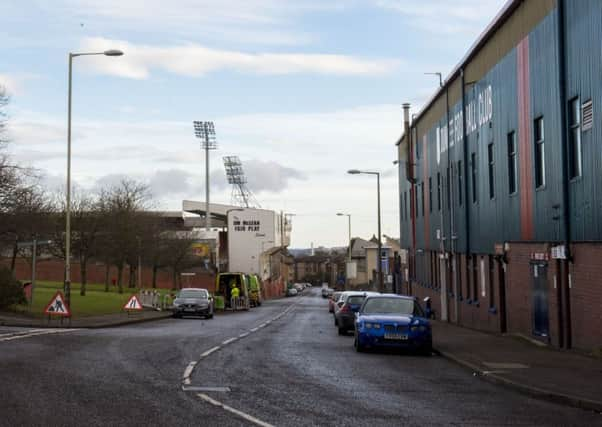Why a Dundee/Dundee United merger would be completely pointless


This was brought about by two events occurring that some took to be sequential. First Dundee United were bought over by Mark Ogren, an American businessman from Stillwater, Minnesota. This was followed by Dundee owner Tim Keyes, an American himself, looking to increase his shareholding in the Dens Park club past 75 per cent, which would remove veto rights from supporters on major decisions taken by the board - such as a merger.
There was nothing to really indicate that’s what either businessman wanted to do, but that didn’t stop panic setting in. It was a case of looking at two Americans and thinking ‘ah, they’re in this together’ which follows a similar line of thinking as that ex-pat bloke from Benidorm insisting you must know ‘wee Jimmy’ because you’re Scottish.
Advertisement
Hide AdAdvertisement
Hide AdWithin hours of each other on Tuesday afternoon, both clubs put the issue to bed - which, if you’re into conspiracy theories, probably only strengthened any previously held beliefs - categorically stating there would be no merger.
“Not gonna happen,” Ogren told Arab Zone. “Not while I’m here. I’m not interested. I’ve never met that group over there. Is there something at some point we could do with them? I wouldn’t say no, but I wouldn’t expect that.
“To me Dundee United’s a community asset, we’re the caretakers for this team and we expect to leave Dundee United, whenever that may be, in a better place than we found it.”
Dundee then followed this up with a statement criticising the Supporters Society and saying “that at no time has the merging of the Dundee clubs ever been discussed in any of these meetings, nor has it ever been contemplated by the owners of the club”.
Of course, football chairman have never been the most honest of individuals. Ogren said he’s in this business to make money - which surely goes against the guidance of any competent financial adviser - so perhaps he gets desperate in the future and decides Dundee City FC is the best course of action.
What he will find is that, if you cannot turn a profit with Dundee United at their lowest ebb, then he’s got a similarly low chance with a united Dundee.
We hear these arguments over and over again. [In a whiny voice] ‘There’s too many teams in Scotland, these clubs should merge, it would be better for the game if they did...’ The argument is easy to understand: the only way to topple the Old Firm dominance is to combine other clubs in order to build superpowers as strong as their base. Unfortunately, for this to work you have to live in a fantasy world. It’s built on the assumption that every single fan is going to go ‘oh, ok, let’s go City!’ and not protest in disgust before ultimately refusing to ever watch another professional football match in Dundee.
There is the Inverness Caledonian Thistle counter-argument. The porn-tweeters were formed in 1994 after two Highland sides - Caledonian and Inverness Thistle - merged together. Since then they’ve gained entry into the league, risen through all four divisions and won a Scottish Cup. The former clubs had crowds in the hundreds, while ICT had an average of around 4,000 when they played in the Premiership. But that’s the kind of growth that comes with entry into the football league structure and the rise through the divisions. Indeed, former Caledonian fans often argue that they could have enjoyed similar success if they’d went it alone and gained an SFL spot as part of the 1994 league expansion. What would be the great benefit to Dundee and Dundee United?
Advertisement
Hide AdAdvertisement
Hide AdAt present it seems pretty obvious. United are struggling to get out of the second tier while Dundee are suffering through a disastrous campaign at the bottom of the Premiership. But football is full of swings and roundabouts and both clubs will see a time in the near future where they are back in the top six with eyes of making a run at a European place if any of Hearts, Hibs or Aberdeen are experiencing a difficult year. The size of each club, in relation to their Scottish football contemporaries, dictates that.
Even if everyone in Dundee were to drink the Kool-Aid and wholly embrace eradicating a combined 236 years of history for a shiny new toy to complain about on a weekly basis, they would still only be the sixth biggest club in Scottish football and about a quarter the size of both halves of the Old Firm.
United’s strongest campaign of recent years came in 2013-14 when Andrew Robertson, Ryan Gauld, Stuart Armstrong and company lit up Scottish football as they challenged for Europe and reached a Scottish Cup final. They were cheered on by an average of 7,599 fans. Dundee, meanwhile, matched their 21st century apex the following season as Paul Hartley’s recently promoted men landed in sixth. Their average attendance was 6,966. That combined total is 14,565 - which, again, is a vastly inflated estimate on what the figure would be post-merger. That’s lower than the average attendance of Aberdeen, Hibs and Hearts this season. Is it really worth it? To support a completely new team so you can become the next Hearts? I’m a Hearts fan and even to me that sounds dreadful.
All that a merger could ever achieve is getting eliminated in the qualifying rounds of the Europa League and losing to either Celtic or Rangers in cup finals with greater consistency. Despite this the argument never seems to fully go away. Thankfully for fans of both teams, it would seem their current owners have greater sense than that.
